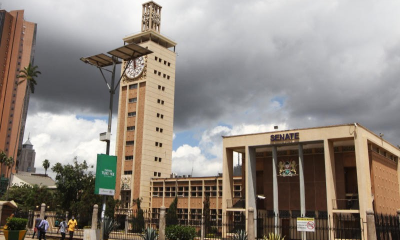Politics
Tribal Hiring In Mudavadi’s Office Exposed
Five departments were found to be overstaffed, eight departments were understaffed, and 10 departments had no staff at all. One department had five employees in positions that were not authorised.

A new audit has put Musalia Mudavadi’s Office of the Prime Cabinet Secretary under scrutiny for ethnic disparity in the workforce.
Auditor-General Nancy Gathungu’s report reveals that two communities dominate the office’s employees, comprising 54 per cent of the total workforce. However, the audit does not specify which communities are involved.
Gathungu expressed concern over this imbalance, stating that most marginalised tribes are underrepresented in the office.
“Most marginalised tribes are not represented in the workforce,” she said, noting that this situation breaches the National Cohesion and Integration Act, 2008.
The Act prohibits any public establishment from having more than a third of its employees from a single ethnic community.
“The management is in breach of the law,” Gathungu stated, underlining the violation of legal guidelines meant to ensure diversity in government offices.
In addition to the ethnic imbalance, the audit revealed that the Office of the Prime Cabinet Secretary is facing serious staffing shortages.
The office, which has an establishment of 177 staff positions, had only 106 staff members in post as of June 30, 2024. This results in a shortage of 71 employees.
The review also found disparities in staffing across departments.
Five departments were found to be overstaffed, eight departments were understaffed, and 10 departments had no staff at all. One department had five employees in positions that were not authorised.
Staffing deficiencies
Gathungu warned that the staffing deficiencies could hinder the office from achieving its strategic goals.
“In the circumstances, the office may not achieve the strategic objectives due to insufficient human resources,” she said.
The office has acknowledged the identified gaps, attributing them to “inadequate numbers of professional or technical officers” and “limited human resource development opportunities caused by lack of approved establishment”.
These findings come shortly after the Public Service Commission reported that Kikuyus and Kalenjins hold a large portion of public sector jobs.
The PSC compliance report for the period ending December 2024 showed that Kikuyus and Kalenjins make up 20 per cent and 17.6 per cent of the public service workforce, with 47,543 Kikuyus and 40,820 Kalenjins employed.
The report also identified non-competitive hiring as a significant cause of this ethnic imbalance, with 29 public institutions found to have one ethnic group constituting over 50 per cent of their staff.
The situation continued into 2024, with ministries recruiting 675 employees non-competitively, just shy of the 686 hired by state corporations.
The audit findings raise serious concerns about the recruitment process, staffing practices, and the overall adherence to laws designed to foster a more inclusive civil service.
Kenya Insights allows guest blogging, if you want to be published on Kenya’s most authoritative and accurate blog, have an expose, news TIPS, story angles, human interest stories, drop us an email on [email protected] or via Telegram
-

 Lifestyle2 days ago
Lifestyle2 days agoThe General’s Fall: From Barracks To Bankruptcy As Illness Ravages Karangi’s Memory And Empire
-

 Americas1 week ago
Americas1 week agoEpstein Files: Bill Clinton and George Bush Accused Of Raping A Boy In A Yacht Of ‘Ritualistic Sacrifice’
-

 Business1 week ago
Business1 week agoCooking Fuel Firm Koko Collapses After Govt Blocks Sh23bn Carbon Deal
-

 Business1 week ago
Business1 week agoABSA BANK IN CRISIS: How Internal Rot and Client Betrayals Have Exposed Kenya’s Banking Giant
-

 Business5 days ago
Business5 days agoKRA Can Now Tax Unexplained Bank Deposits
-

 Investigations4 days ago
Investigations4 days agoEpstein Files: Sultan bin Sulayem Bragged on His Closeness to President Uhuru Then His Firm DP World Controversially Won Port Construction in Kenya, Tanzania
-

 News5 days ago
News5 days agoAUDIT EXPOSES INEQUALITY IN STAREHE SCHOOLS: PARENTS BLED DRY AS FEES HIT Sh300,000 AGAINST Sh67,244 CAP
-

 News1 week ago
News1 week agoPuzzle Of Mysterious 15 Deaths of Street Children in Nairobi Under A Month and Mass Burials



























